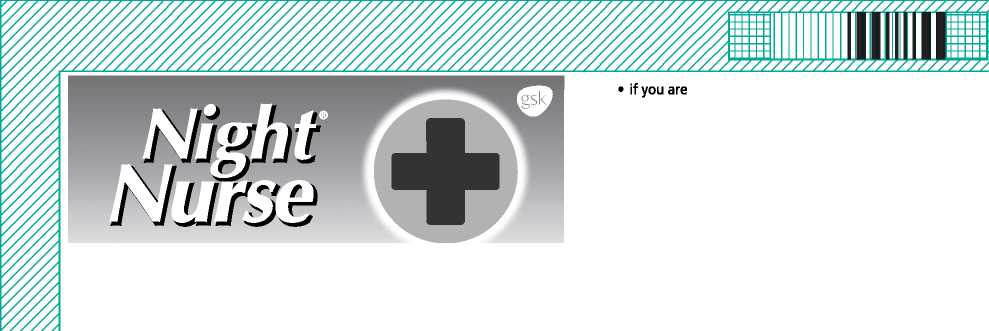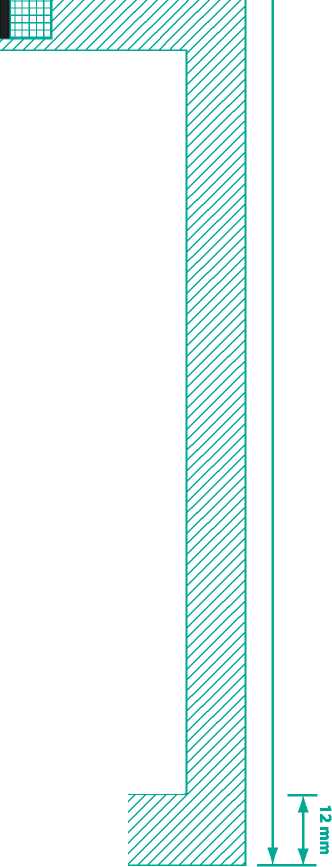Night Nurse
40 mm
10mm
|
Last bar ^ |
First bar | ||||
|
200 mm | |||||
|
H I 1I | |||||
eo
3
3

Paracetamol, Promethazine, Dextromethorphan
Please read right through this leaflet before you start using this medicine.
This medicine is available without prescription, but you still need to use Night Nurse carefully to get the best results from it.
• Keep this leaflet you may need to read it again.
• If you have any further questions, ask your pharmacist.
In this leaflet:
1. What Night Nurse does
2. Check before you take Night Nurse
3. Howto take Night Nurse
4. Possible side effects
5. Howto store Night Nurse
6. Further information
1. What Night Nurse does
Night Nurse is used for the night-time relief of the major symptoms of colds, chills and flu. The medicine contains three active ingredients. Paracetamol is a painkiller and reduces your temperature when you have a fever. Promethazine hydrochloride is an antihistamine which dries up a runny nose and aids restful sleep. Dextromethorphan hydrobromide is a cough suppressant that helps relieve dry or tickly coughs. Night Nurse also helps to relieve a sore throat.
2. Check before you take Night Nurse
□ Do not take Night Nurse:
• if you have ever had an allergic reaction to paracetamol, promethazine hydrochloride, dextromethorphan hydrobromide or to any of the other ingredients (listed in Section 6)
• if you have a chest infection, worsening asthma or severe respiratory problems.

150 mm
taking or have taken monoamine oxidase inhibitors (MAOIs) prescribed for depression in the last two weeks.
• if you are having a pregnancy test carried out on your urine.
Do not take anything else containing paracetamol while taking this medicine.
Do not take with other cough or cold medicines, or any other products containing antihistamines, including those used on your skin.
H Take special care with Night Nurse:
• Do not drink alcohol while using Night Nurse.
• Night Nurse contains 18% v/v ethanol (alcohol), i.e. up to 2.9 g per dose, equivalent to 72 ml beer, 30 ml wine per dose. This could be harmful if you suffer from alcoholism. This should also be considered if you are pregnant or breast-feeding, in children and high-risk groups such as patients with liver disease or epilepsy.
• If your symptoms are accompanied by a high temperature, skin rash or persistent headache, see your doctor.
n Driving and operating machinery
This medicine can affect your ability to drive as it may cause drowsiness, dizziness, difficulty concentrating, movement difficulties or blurred vision.
If affected do not drive or operate machinery.
• Do not drive while taking this medicine until you know how it affects you.
• It may be an offence to drive when taking this medicine.
• However, you would not be committing an offence if the medicine has been taken to treat a medical or dental problem, and you have taken it according to the information provided with the medicine, and it was not affecting your ability to drive safely.
Talk to your doctor or pharmacist if you are not sure whether it is safe for you to drive while taking this medicine. Details regarding a new driving offence concerning driving after drugs have been taken in the UK may be found here: www.oov.uk/druo-drivinq-law.
n Ask your doctor before you take this medicine:
• if you have heart, kidney or liver problems.
• if you have glaucoma, epilepsy, difficulty passing urine, or prostate problems.
• if you have chronic or persistent cough accompanied by excessive phlegm or respiratory problems.
• if you have diabetes mellitus. Each dose contains 12.8 g of glucose
• if you are on a sodium-controlled diet. Each 20 ml dose contains 37 mg of sodium.
• If you are elderly and suffer from confusion.
-////
If you are taking other medicines
Please talk to your doctor or pharmacist before taking this medicine if you are taking any prescribed medicines; particularly metoclopramide or domperidone (for nausea or vomiting); colestyramine (to lower blood cholesterol); medicines which give you blurred vision, a dry mouth or make you drowsy; blood thinning drugs (anticoagulants e.g. warfarin); quinidine or amiodarone (to control your heart rhythm); medicines for anxiety or depression (e.g. selective serotonin reuptake inhibitor (SSRI) or tricyclic antidepressant) or to help you sleep.
n Pregnancy and breast-feeding
Do not take Night Nurse if you are pregnant or breast-feeding.
3. How to take Night Nurse
QFill the measuring cup to the 20 ml mark.
Take one 20 ml dose (four teaspoonfuls) at bedtime.
O* Do not take Night Nurse if you have already taken 4 doses (4000 mg) of a paracetamol-containing product (including this product) in any 24 hour period. If in doubt consult your doctor or pharmacist.
• Only take one dose of Night Nurse per night.
• Do not take more than the recommended dose.
• Do not take for more than 3 days.
• Do not take if you are under 12 years.
Carers should be aware that this medicine should not be given to elderly patients with confusion. The elderly are more likely to develop adverse effects, including confusion, with this medicine.
If you take too much
Talk to a doctor at once if you take too much of this medicine, even if you feel well. This is because too much paracetamol can cause delayed, serious liver damage.
If your symptoms persist, see your doctor.
4. Possible side effects
Like all medicines Night Nurse can have side effects, but not everyone gets them. Children and the elderly may be more likely to experience side effects with this medicine.
The following side effects may occur:
• Drowsiness, dizziness, blurred vision, difficulty concentrating, unsteadiness, clumsiness, headache, dry mouth.
Stop taking this medicine and tell your doctor immediately if you experience:
• Allergic reactions which may be severe such as skin rash, itching sometimes with swelling of the mouth or face or shortness of breath
• Skin rash or peeling or mouth ulcers
• Breathing problems. These are more likely if you have experienced them before when taking other painkillers (such as ibuprofen and aspirin)
• Unexplained bruising and bleeding
• Confusion, feeling restless, sweating, shaking, shivering, sudden jerks of muscles or increased blood pressure
• Difficulty passing urine.
• Nausea, vomiting, stomach ache, sudden weight loss, loss of appetite and yellowing of the eyes and skin.
• Restlessness, nervousness, feeling irritable, increased energy and sleep disturbances, which are more likely to affect children.
These effects are rare.
If you get any side effects, talk to your doctor, pharmacist or nurse. This includes any possible side effects not listed in this leaflet. You can also report side effects directly via the Yellow Card Scheme at: www.mhra.oov.uk/vellowcard.
By reporting side effects you can help provide more information on the safety of this medicine.
5. How to store Night Nurse
Keep out of the sight and reach of children.
Do not take this medicine after the 'EXP' date shown on the pack.
6. Further information
Active ingredients Each 20 ml dose contains Paracetamol 1000 mg.
Promethazine Hydrochloride 20 mg.
Dextromethorphan Hydrobromide 15 mg
Other ingredients Liquid glucose, ethanol (alcohol), macrogol 300,
sodium cydamate, acesulfame K, sodium citrate, ascorbic acid,
disodium edentate, medicated flavour liquid,
colours quinoline yellow (E 104) and patent blue V (E 131) and water.
This bottle contains 160 ml
The marketing authorisation holder is GlaxoSmithKline Consumer Healthcare (UK) Trading Limited, Brentford, TW8 9GS, U.K. and all enquiries should be sent to this address.
The manufacturer is Wrafton Laboratories Ltd, Wrafton,
Braunton, North Devon, EX33 2DL, U.K.
This leaflet was last revised in December 2015.
Night Nurse is a registered trademark owned by or licensed to the GSK group of companies.
SA51 L610002/16